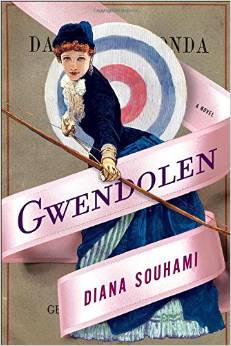First I want to admit I haven’t read George Eliot since high school. But I remember enjoying Silas Marner and Middlemarch so when I had the chance to read historian Diana Souhami’s Gwendolyn, which is based on a character in another one of Eliot’s novels, Daniel Deronda, I snatched it up.
At first I thought I had made a huge mistake.
The book starts off slowly, probably much in the style of Eliot and not in a style that I’m used to reading as of late. It didn’t help that I had just finished Gina Frangello’s A Life in Men, which was fan-fucking-tastic. So Gwendolyn, Souhami’s first foray into fiction, had a lot to live up to.
Something else that got on my nerves at first was Gwen’s referring to Deronda as “you” throughout the book. I understand that the novel is in the form of a letter, but all the you’s got pretty tedious after a while, especially in the scenes with Deronda, who seemed like a high and mighty killjoy if you ask me.
But then something happened. Deronda left the picture, and the book got a whole lot more interesting.
Every single other character was a hell of a lot more interesting than Deronda, from Gwen herself, to her cruel and sadistic husband, Grandcourt, to the unique and artistic friends she makes post-marriage, to George Eliot herself, who while a celebrated author is also nosy, judgmental, and insecure.
The story of Gwen’s marriage to Grandcourt is horrific yet gripping, and I found myself rooting for her escape and, afterward, her growth and freedom without rescue from a “prince.”
I also kept anxiously waiting for Grandcourt to show up on her doorstep, alive and well, since his body, post-drowning, never washed up on shore. But as Gwen gained strength and confidence, in addition to her new circle of friends, I was less anxious, not that Grandcourt wouldn’t show, but because I thought she could handle herself if he did.
The sign of well-done historical fiction for me is when while I’m reading or immediately afterward, I look up all the “characters.” That happened with The Paris Wife and it happened with Gwendolyn.
Right after I finished I looked up George Eliot to find out more about her longtime companion George Lewes, with whom she had an open relationship although she liked to be called Mrs. Lewes, and after his death, her marriage to a man 20 years her junior — in the book, it’s said she called him her “nephew,” weird — who during their honeymoon in Venice “jumped from their hotel balcony into the Grand Canal.” (He survived.)
Another “real” character is Paul Leroy, a French painter who lives with his probable-lover Antoine. Julian, a trapeze artist who cross-dresses as Juliette, might be based on the “female impersonator, high-wire performer” Barbette, who, like Julian, was born in Texas (although many years after Julian would have been) and performed in drag, only revealing himself as male at the end of his performance. That could be a whole book in and of itself.
Overall I enjoyed the book, and think that fans of Eliot and especially Daniel Deronda will enjoy it even more.







